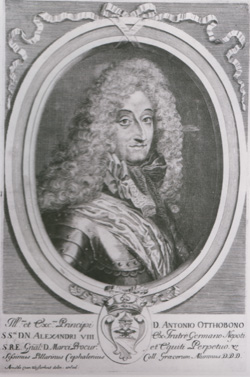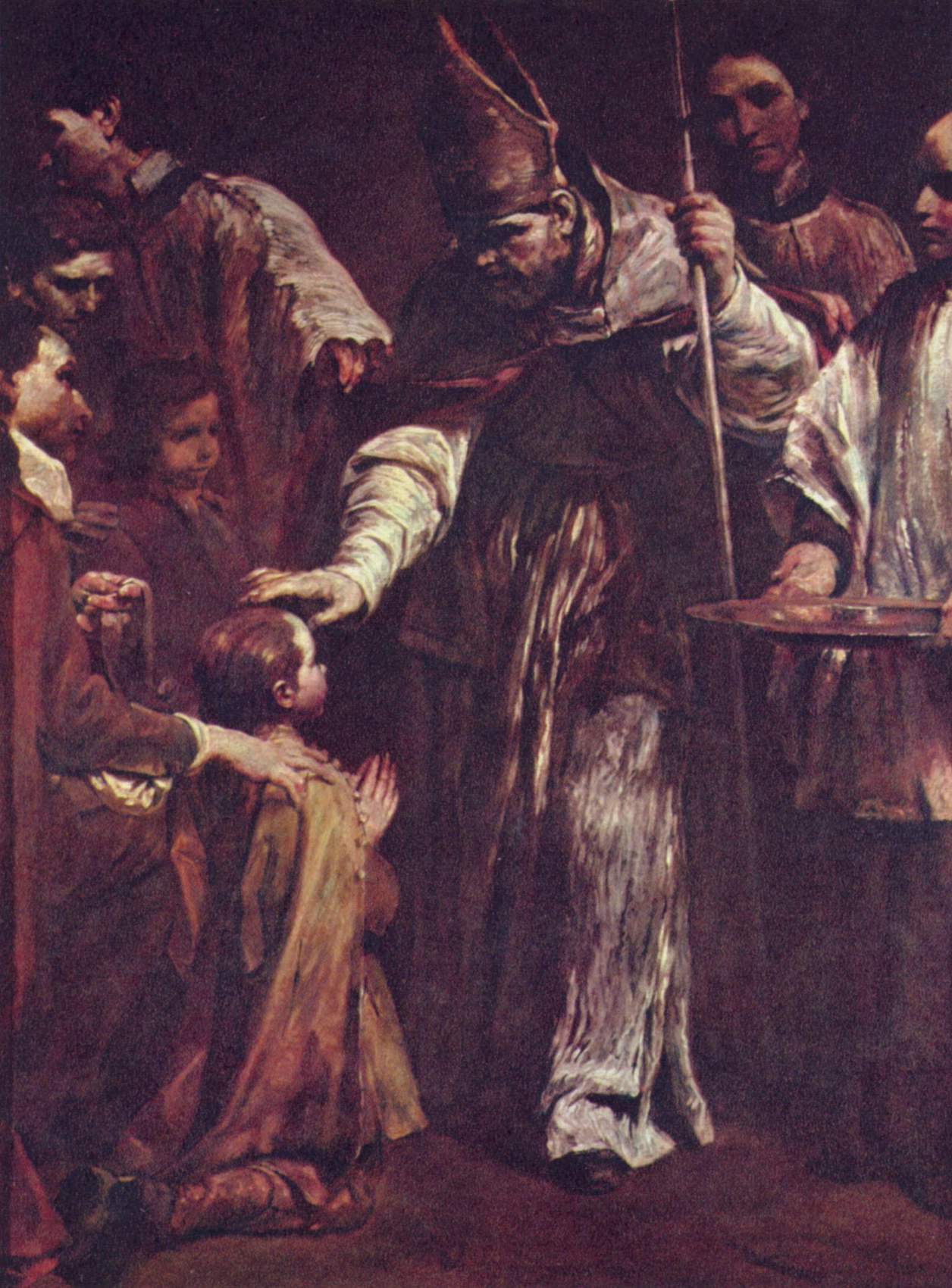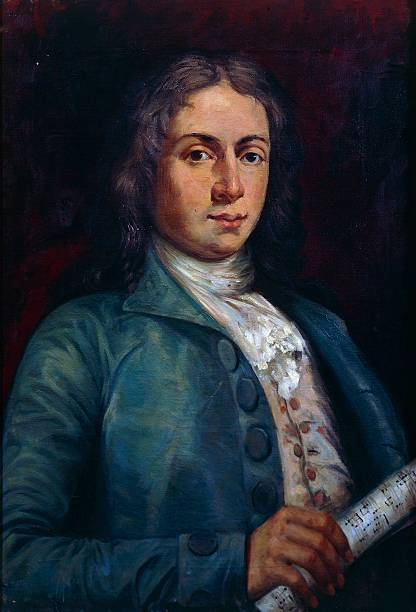|
Antonio Ottoboni
Antonio Ottoboni (1646–1720) was a Neapolitan general, nephew of Pope Alexander VIII and the father of Cardinal Pietro Ottoboni. Prince Antonio Ottoboni, a general of the papal army, came to Naples in 1694. Like his son, Cardinal Ottoboni, Prince Antonio was an enthusiastic patron of music. He supplied the libretto for Alessandro Scarlatti's second smaller setting of ''La Giuditta'' in 1697, and texts for many cantatas. Before 1707, probably in 1703 or 1704, he appointed Scarlatti his ''maestro di cappella''.Edward Joseph Dent ''Alessandro Scarlatti: His Life and Works'' 2008 Page 74 References {{DEFAULTSORT:Ottoboni, Antonio 1646 births 1710 deaths Italian opera librettists Italian male dramatists and playwrights 17th-century Italian nobility Captains General of the Church Antonio Antonio is a masculine given name of Etruscan origin deriving from the root name Antonius. It is a common name among Romance language-speaking populations as well as the Balkans and Lusop ... [...More Info...] [...Related Items...] OR: [Wikipedia] [Google] [Baidu] |
Pope Alexander VIII
Pope Alexander VIII ( it, Alessandro VIII; 22 April 1610 – 1 February 1691), born Pietro Vito Ottoboni, was head of the Catholic Church and ruler of the Papal States from 6 October 1689 to his death in February 1691. He is to date the last pope to take the pontifical name of "Alexander" upon his election to the papacy. Alexander VIII is known for having overturned many of the policies of his predecessor, Innocent XI, deciding to indulge in nepotism in order to further enrich his family. Such nepotism exhausted the papal treasury, later forcing his successor, Innocent XII, to implement austere measures to restore the papal coffers. Despite his brief papacy, during which little of importance was undertaken, Alexander VIII is known for having condemned the doctrines of the so-called philosophical sin which was being taught in schools run by the Society of Jesus. Also during his papacy, King Louis XIV of France restored Avignon to the Holy See as a territory of the Papal Stat ... [...More Info...] [...Related Items...] OR: [Wikipedia] [Google] [Baidu] |
Pietro Ottoboni (cardinal)
Pietro Ottoboni (2 July 1667 – 28 February 1740) was an Italian cardinal and grandnephew of Pope Alexander VIII, who was also born Pietro Ottoboni. He is remembered especially as a great patron of music and art. Ottoboni was the last person to hold the curial office of Cardinal-nephew, which was abolished by Alexander's successor, Pope Innocent XII, in 1692. Ottoboni '"loved pomp, prodigality, and sensual pleasure, but was in the same time kind, ready to serve and charitable". Overview Pietro was born in Venice to the noble Ottoboni family, whose most prominent member had been his granduncle Pope Alexander VIII (1689–1691). The family bought their way into Venetian nobility in the 17th century. He received the clerical tonsure and minor orders on 20 October 1689 and was created cardinal deacon in the consistory of 7 November 1689, receiving the red hat on 14 November. He was superintendent general of the affairs of the Apostolic See and governor of the cities of Fermo an ... [...More Info...] [...Related Items...] OR: [Wikipedia] [Google] [Baidu] |
Alessandro Scarlatti
Pietro Alessandro Gaspare Scarlatti (2 May 1660 – 22 October 1725) was an Italian Baroque composer, known especially for his operas and chamber cantatas. He is considered the most important representative of the Neapolitan school of opera. Nicknamed by his contemporaries "the Italian Orpheus", he divided his career between Naples and Rome, where he received his training; a significant part of his works was composed for the papal city. He is often considered the founder of the Neapolitan school, although he has only been its most illustrious representative: his contribution, his originality and his influence were essential, as well as lasting, both in Italy and in Europe. Particularly known for his operas, he brought the Italian dramatic tradition to its maximum development, begun by Monteverdi at the beginning of 17th century and continued by Cesti, Cavalli, Carissimi, Legrenzi and Stradella, designing the final form of the ''Da capo aria'', imitated throughout Europe. H ... [...More Info...] [...Related Items...] OR: [Wikipedia] [Google] [Baidu] |
La Giuditta
:''To be distinguished from Giuditta a German operetta by Franz Lehár.'' Note La Giuditta may refer to one of several Italian oratorios, further elaborated below. Each version of La Giuditta deals with the figure of Judith, from the Biblical Apocrypha, who liberated the besieged city of Bethulia by seducing and then beheading the enemy General Holofernes. Judith and Holofernes are the two main roles common to all versions. Incidental characters, such as, in the larger Scarlatti Giuditta, Achior, a captain so revolted by Holofernes' brutality that he defects to the Israelite army, do not occur in other versions. Italian language oratorios Scarlatti's Rome Giuditta Alessandro Scarlatti: ''La Giuditta'', Rome, 1693. Libretto by Cardinal Pietro Ottoboni. "Scarlatti considered it his finest oratorio, and its dramatic structure, rapidly interweaving brief scenes in Holofernes's camp with events in the troubled city, is remarkable." :Recordings: * Giuditta: Mária Zádori, Olofern ... [...More Info...] [...Related Items...] OR: [Wikipedia] [Google] [Baidu] |
1646 Births
It is one of eight years (CE) to contain each Roman numeral once (1000(M)+500(D)+100(C)+(-10(X)+50(L))+5(V)+1(I) = 1646). Events January–March * January 5 – The English House of Commons approves a bill to provide for Ireland to be governed by a single Englishman. * January 9 – The Battle of Bovey Heath takes place in Devonshire, as Oliver Cromwell's New Model Army surprises and routs the Royalist camp of Lord Wentworth. * January 19 – Sir Richard Grenville, 1st Baronet, a Royalist fighting for Prince Charles against Oliver Cromwell's Commonwealth, is imprisoned for insubordination after proposing to make Cornwall self-governing in order to win Cornish support for the Royalists. After being incarcerated at the tidal island of St Michael's Mount off of the coast of Cornwall, he is allowed to escape in March to avoid capture by Cromwell's troops. * January 20 – Francesco Molin is elected as the 99th Doge of Venice after 23 ballots, and gove ... [...More Info...] [...Related Items...] OR: [Wikipedia] [Google] [Baidu] |
1710 Deaths
Year 171 ( CLXXI) was a common year starting on Monday (link will display the full calendar) of the Julian calendar. At the time, it was known as the Year of the Consulship of Severus and Herennianus (or, less frequently, year 924 ''Ab urbe condita''). The denomination 171 for this year has been used since the early medieval period, when the Anno Domini calendar era became the prevalent method in Europe for naming years. Events By place Roman Empire * Emperor Marcus Aurelius forms a new military command, the ''praetentura Italiae et Alpium''. Aquileia is relieved, and the Marcomanni are evicted from Roman territory. * Marcus Aurelius signs a peace treaty with the Quadi and the Sarmatian Iazyges. The Germanic tribes of the Hasdingi (Vandals) and the Lacringi become Roman allies. * Armenia and Mesopotamia become protectorates of the Roman Empire. * The Costoboci cross the Danube (Dacia) and ravage Thrace in the Balkan Peninsula. They reach Eleusis, near Athens, and de ... [...More Info...] [...Related Items...] OR: [Wikipedia] [Google] [Baidu] |
Italian Opera Librettists
Italian(s) may refer to: * Anything of, from, or related to the people of Italy over the centuries ** Italians, an ethnic group or simply a citizen of the Italian Republic or Italian Kingdom ** Italian language, a Romance language *** Regional Italian, regional variants of the Italian language ** Languages of Italy, languages and dialects spoken in Italy ** Italian culture, cultural features of Italy ** Italian cuisine, traditional foods ** Folklore of Italy, the folklore and urban legends of Italy ** Mythology of Italy, traditional religion and beliefs Other uses * Italian dressing, a vinaigrette-type salad dressing or marinade * Italian or Italian-A, alternative names for the Ping-Pong virus, an extinct computer virus See also * * * Italia (other) * Italic (other) * Italo (other) * The Italian (other) * Italian people (other) Italian people may refer to: * in terms of ethnicity: all ethnic Italians, in and outside of Italy * in ... [...More Info...] [...Related Items...] OR: [Wikipedia] [Google] [Baidu] |
Italian Male Dramatists And Playwrights
Italian(s) may refer to: * Anything of, from, or related to the people of Italy over the centuries ** Italians, an ethnic group or simply a citizen of the Italian Republic or Italian Kingdom ** Italian language, a Romance language *** Regional Italian, regional variants of the Italian language ** Languages of Italy, languages and dialects spoken in Italy ** Italian culture, cultural features of Italy ** Italian cuisine, traditional foods ** Folklore of Italy, the folklore and urban legends of Italy ** Mythology of Italy, traditional religion and beliefs Other uses * Italian dressing, a vinaigrette-type salad dressing or marinade * Italian or Italian-A, alternative names for the Ping-Pong virus, an extinct computer virus See also * * * Italia (other) * Italic (other) * Italo (other) * The Italian (other) * Italian people (other) Italian people may refer to: * in terms of ethnicity: all ethnic Italians, in and outside of Italy * in ... [...More Info...] [...Related Items...] OR: [Wikipedia] [Google] [Baidu] |
17th-century Italian Nobility
The 17th century lasted from January 1, 1601 ( MDCI), to December 31, 1700 ( MDCC). It falls into the early modern period of Europe and in that continent (whose impact on the world was increasing) was characterized by the Baroque cultural movement, the latter part of the Spanish Golden Age, the Dutch Golden Age, the French ''Grand Siècle'' dominated by Louis XIV, the Scientific Revolution, the world's first public company and megacorporation known as the Dutch East India Company, and according to some historians, the General Crisis. From the mid-17th century, European politics were increasingly dominated by the Kingdom of France of Louis XIV, where royal power was solidified domestically in the civil war of the Fronde. The semi-feudal territorial French nobility was weakened and subjugated to the power of an absolute monarchy through the reinvention of the Palace of Versailles from a hunting lodge to a gilded prison, in which a greatly expanded royal court could be more easily k ... [...More Info...] [...Related Items...] OR: [Wikipedia] [Google] [Baidu] |
Captains General Of The Church
Captain is a title, an appellative for the commanding officer of a military unit; the supreme leader of a navy ship, merchant ship, aeroplane, spacecraft, or other vessel; or the commander of a port, fire or police department, election precinct, etc. In militaries, the captain is typically at the level of an officer commanding a company or battalion of infantry, a ship, or a battery of artillery, or another distinct unit. The term also may be used as an informal or honorary title for persons in similar commanding roles. Etymology The term "captain" derives from (, , or 'the topmost'), which was used as title for a senior Byzantine military rank and office. The word was Latinized as capetanus/catepan, and its meaning seems to have merged with that of the late Latin "capitaneus" (which derives from the classical Latin word "caput", meaning head). This hybridized term gave rise to the English language term captain and its equivalents in other languages (, , , , , , , , , kapitány, K ... [...More Info...] [...Related Items...] OR: [Wikipedia] [Google] [Baidu] |





